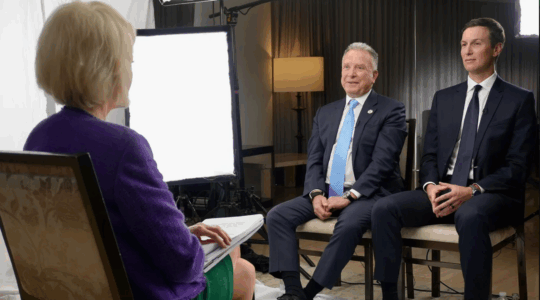NEW YORK (JTA) – With polls showing Hillary Rodham Clinton and Barack Obama enjoying commanding leads in their home states of New York and Illinois respectively, the most important battlegrounds on Feb. 5 – and some of the most delegate-rich prizes – lay elsewhere.
California, New Jersey, Arizona, Massachusetts and Connecticut – states with some of the largest Jewish populations in the country – will be awarding more than one-third of the 2,061 Democratic delegates up for grabs on Super Tuesday.
In dozens of interviews with Jewish voters in some of those states, Clinton was the clear choice among Democrats. But like so many others in an election season marked by a greater diversity of viable candidates than any in recent memory, a number of those voters remain uncommitted and are conflicted about their choices.
Among a dozen voters interviewed last week at the San Francisco Jewish Community Center, most were firmly in the Clinton camp. All but two were registered Democrats, and two had already voted by mail.
Much of the support among the Clinton crowd seemed tactical. Several of those interviewed told JTA that Clinton is the most electable Democrat, the candidate most likely to snatch the White House from Republican hands.
“I don’t think Obama can win the November election,” said Stefanie Kohn, 36, who said she hasn’t yet made up her mind, but is “seriously leaning towards” Clinton.
“It’s those swing voters, the middle of the country,” said her sister, Alyson Kohn, 40. “Are they really going to vote for a black man?”
Neither candidate excites the Kohn sisters – “They’re not far enough left for me,” Stefanie said – but ejecting the Republicans from the White House is uppermost in their minds.
“Electability is huge,” Stefanie said, adding that Clinton’s experience in “knowing how to work Washington” is also important to her.
Andy S., 45, who declined to give his last name, said he is voting for Obama because of the man more than the message.
“He’s potentially a little more honest, a little less political,” he opined.
Lisa Mandelstein, 47, was the lone supporter of John Edwards, the former North Carolina senator who is fighting an uphill battle.
“I like his focus on working-class Americans and the economics surrounding that, and I feel like keeping some attention on those issues,” she said.
Across the country, in New Jersey, Orthodox voters with strong attachments to Israel tended to lean toward Republican candidates.
Chesky Kasmatt, 27, of Passaic, a religiously right-wing Orthodox enclave, was casting his lot with Rudy Giuliani.
“Giuliani did a great job in New York,” said Kasmatt, who was interviewed while having lunch at a kosher eatery in Teaneck with his wife, Faigy, and their four children.
“On the No. 1 issue, terrorism, he is very strong,” Kasmatt said. “I think he would be a great leader.”
Both Chesky and Faigy Kasmatt, also 27, questioned whether Obama would support Israel. Chesky Kasmatt mentioned the widely condemned and debunked e-mail rumors alleging that the Illinois senator was raised a Muslim and attended a radical school in Indonesia.
“If a conservative was in a madrassah for two years – let alone a Wahabi madrassah – he would never get near” the Oval Office, said Kasmatt, who works in a Jewish bookstore in Manhattan.
And Clinton?
“I don’t think that a woman can make the decisions that will have to be made when it comes down to it,” Faigy Kasmatt said. “I don’t think she can push the button and send the nuke that has to be sent.
“It is a hard decision for anyone to make. All those men, women and children who would get killed on the ground, I would just think about all of those kids, and I think that a woman would have a harder time doing this.”
Though many Jewish voters cite Israel as a major factor in their electoral choices, not everyone concerned with the safety of the Jewish state votes Republican.
“Israel is a very big factor for me,” said Amanda Vassigh, 34, from northern California. Clinton, she said, “is a realist, and she understands the United States has to stand with Israel. And if she wants the Jewish vote, she has to stand with Israel.”
Gary Kaufman, 46, from Brooklyn, N.Y., backs Giuliani – for vice president. The owner of a company that manufactures flexible packaging, Kaufman would like to see a Republican ticket of U.S. Sen. John McCain (R-Ariz.) for president with Giuliani as his running mate. Giuliani could succeed McCain after one or two terms, once he has more national political experience.
Like many voters, Kaufman said the economy and national security trump all other issues in this election. But the Democrats would be a disaster on both fronts, he said.
Kaufman said the Democrats’ idea of an economic fix is “to put everybody on welfare and to give everyone food stamps,” while the Republican idea is cutting taxes to spur business.
“This country wasn’t built on social welfare, it was built on people taking a chance and starting a business,” said Kaufman, whose company has 75 employees. “Any time I have money to reinvest because of tax breaks, it means that I am buying more equipment. More equipment means more jobs. More jobs means more production. It is better for the local economy. You hire people from the community. And it is better for the national economy.”
Among many New Jersey Jewish Democrats, the choice between Obama and Clinton is proving to be difficult. Several who attended the recent annual fund-raiser of the Jewish Federation of Central New Jersey said the recent bickering between the camps had muddied the water for them.
One Democrat who wasn’t undecided was Lou Beckerman, a co-chair of the local Jewish Community Relations Council.
“I’m for Hillary,” he said. “It’s time we had a woman president.”
A quick canvas of the canasta players at the Jewish community campus in Whippany, N.J., revealed 23 Clinton supporters out of 24.
“The most wonderful thing this country could have is a woman president after men have done such a wonderful job messing up the world,” said Norma Gridinsky of Madison. “That’s No. 1. It will change everything.”
A number of Clinton supporters said they saw President Bill Clinton as a significant asset.
Adrian Rothblatt of Denville, N.J. voted by absentee ballot for the candidate she called “Hillbilly,” suggesting that the former president would play a major role in his wife’s administration. Mitzi Husid of Florham Park said she is for Hillary Clinton because of Bill.
“Having his ear is an asset,” Husid said. “She will use him to advantage and he will mend some fences around the world.”
Husid said she would “probably” vote for Obama if he wins the nomination.
Donna Bojarsky, a political analyst in Los Angeles, agrees that Bill Clinton has given his wife a slight edge among the country’s Jews.
“If Bill Clinton were running, he would get 92 percent of the Jewish vote,” Bojarsky said. “Hillary won’t get that much, but she’ll do well.”
Though Californians in general, and California Jews in particular, skew heavily Democratic, some analysts are paying special attention to the voting patterns of three Jewish subgroups – relatively recent immigrants from Iran, Israel and the former Soviet Union – who tend to support Republican candidates.
Si Frumkin, a columnist for local Russian and English-language newspapers, predicts that about 70 percent of the Russian community, numbering between 60,000 to 100,000, will vote Republican.
“They know what happens when the left wing takes over and they perceive that the Democrats were reluctant to take on the Soviet Union,” said Frumkin, a supporter of Mitt Romney for his economic expertise.
Giuliani has made a special effort to cultivate the local Russian community, appearing at a $100 per couple fund-raiser, but his efforts have faded in the last few weeks, said Frumkin.
Republicans are also likely to do well in the 30,000-strong Iranian community, which gave Bush some 80 percent of its votes in 2004.
“What drives us is national security, the war on terrorism and foreign policy,” said Sam Kermanian, secretary-general of the Iranian American Jewish Federation.
Kermanian, who worked for the Bush campaign during the last election, projects that most of his community’s Republican votes will go to Giuliani and McCain.
Karmel Melamed, a young Iranian-American journalist, believes that his community is now split between a conservative older generation of original immigrants deeply concerned about Israel’s safety and their younger, mostly American-born children and grandchildren.
Among the younger demographic, Melamed expects a 50-50 split between Republicans and Democrats.
Israeli expatriates, believed to number around 100,000, will play a smaller role than their numbers warrant, according to journalist Avner Hofstein, who covers Southern California for the Israeli daily Yediot Achronot.
Many Israeli expats don’t vote either because they aren’t citizens or just aren’t politically engaged. But among those who did go to the polls in 2004, George Bush won the overwhelming share of votes for his staunch support of Israel.
Hofstein believes that most Israeli votes this time will go to Clinton, in large part because of her experience and her husband’s popularity in Israel.
“If I could vote, it would be for Hillary,” Hofstein said. “Based on my experience with Israeli politicians, we have done better with steady, stable leaders than with charismatic newcomers.”
(With reporting from JTA staff writer Jacob Berkman in Teaneck, N.J., correspondents Sue Fishkoff in San Francisco and Tom Tugend in Los Angeles, and New Jersey Jewish News writers Elaine Durbach and Robert Wiener in Whippany, N.J.)
JTA has documented Jewish history in real-time for over a century. Keep our journalism strong by joining us in supporting independent, award-winning reporting.





